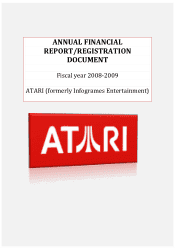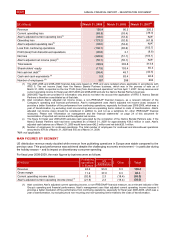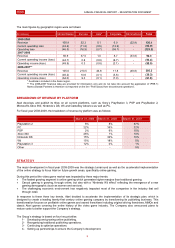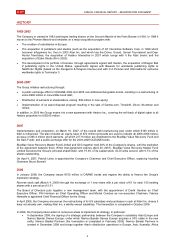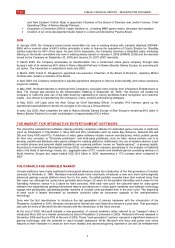Atari 2009 Annual Report Download - page 9
Download and view the complete annual report
Please find page 9 of the 2009 Atari annual report below. You can navigate through the pages in the report by either clicking on the pages listed below, or by using the keyword search tool below to find specific information within the annual report.
ANNUAL FINANCIAL REPORT – REGISTRATION DOCUMENT
9
and New Zealand. Patrick Staar is appointed Chairman of the Board of Directors and Jackie Fromion, Chief
Operating Officer of Namco Bandai Partners;
Acquisition in December 2008 of Cryptic Studios Inc., a leading MMO game creator, developer and operator;
Creation of an online development studio based in London and directed by Paulina Bozek.
2009
In January 2009, the Company issues bonds convertible into new or existing shares with warrants attached (ORANE-
BSA) with a nominal value of €40.5 million principally in order to finance the acquisition of Cryptic Studios Inc. BlueBay
entities subscribe for 84% of the issue. As part of this transaction, the Company launches a simplified public exchange
offering on the bonds convertible into new or existing shares issued on January 4, 2008 (ORANE 2008) and the warrants
issued by the Company on September 22, 2006 and January 24, 2007 (2007 warrants).
In March 2009, the Company accelerates its transformation into a content-led online game company through Atari
Europe‟s sale of its remaining 66% stake in Namco Bandai Partners to Namco Bandai Games Europe, by exercising its
put option. The transaction is completed in early July 2009.
In March 2009, Frank E. Dangeard is appointed non-executive Chairman of the Board of Directors, replacing Michel
Combes who remains a member of the Board.
In April 2009, the Company implements a liquidity agreement designed to improve share liquidity and reduce excessive
long-term volatility.
In May 2009, the Board decides to implement the Company‟s corporate name change from Infogrames Entertainment to
Atari. The change was decided by the Shareholders‟ Meeting of September 25, 2008. This decision will enable the
Company to make the best use of the Atari brand by capitalizing on strong worldwide brand recognition and customer
loyalty – key drivers to implementing the Company‟s online, product and licensing strategies.
In May 2009, Jeff Lapin joins the Atari Group as Chief Operating Officer. In parallel, Phil Harrison gives up his
operational responsibilities to devote his energies to his role as a Group director.
In early July 2009, Atari completes the sale to Namco Bandai Games Europe of Atari Europe‟s remaining 66% stake in
Namco Bandai Partners for a cash consideration of approximately €36.3 million.
THE MARKET FOR INTERACTIVE ENTERT AINMENT SOFTWARE
The interactive entertainment software industry primarily comprises software for dedicated game consoles or platforms
(such as PlayStation 2, PlayStation 3, Xbox 360 and Wii), handhelds (such as Game Boy Advance, Nintendo DS and
DSi and Sony PSP) and PCs. Publishers of video game software include console manufacturers, which publish games
for their own consoles, or "first-party publishers", and third-party publishers, such as Atari, whose primary role is to
develop, publish and distribute video game software for existing platforms. Additionally, the use of wireless devices (such
as mobile phones and personal digital assistants) as a gaming platform, known as "mobile gaming", is growing rapidly.
According to International Development Group (IDG), an independent company specializing in the analysis of statistical
data in the fields of technology, media, etc., aggregate sales of PC, console and handheld games (excluding wireless) in
North America, Europe and Japan totaled USD 26.9 billion in 2008, representing a 17% increase when compared to
2007.
THE CONSOLE AND HANDHELD MARKET
Console platforms have made significant technological advances since the introduction of the first generation of modern
consoles by Nintendo in 1985. Hardware manufacturers have historically introduced a new and more technologically
advanced gaming console platform every four to five years. So-called portable consoles have also evolved since they
first came out, although the cycles have generally been longer (10 years for the portable GameBoy and 6 years for the
GameBoy Advance, versus 4 to 5 years for fixed consoles). With each new cycle, the customer base for video game
software has expanded as gaming enthusiasts mature and advances in video game hardware and software technology
engage new participants, generating greater numbers of console units purchased than in the prior cycle. The beginning
of each cycle is largely dominated by hardware (console) sales as consumers upgrade to the next-generation
technology.
Sony was the first manufacturer to introduce the last generation of console hardware with the introduction of the
Playstation 2 platform in 2000. Nintendo introduced its GameCube and Game Boy Advance a year later. That generation
also saw the entry of Microsoft into the industry with the introduction of the Xbox console.
At the end of 2005, Microsoft initiated a new generation of console hardware (often referred to as "nextgen") when it
introduced Xbox 360 on a market dominated by Sony's Playstation 2 (released in 2000). Nintendo's Wii was released in
December 2006 and Sony's PS3 at the end of 2006. These "next-generation" systems represent a significant advance in
gaming technology, with the potential to reach broader audiences. While Microsoft and Sony add power and online
features to their hardware to create an ever more realistic and advanced gaming experience (as well as entertainment

